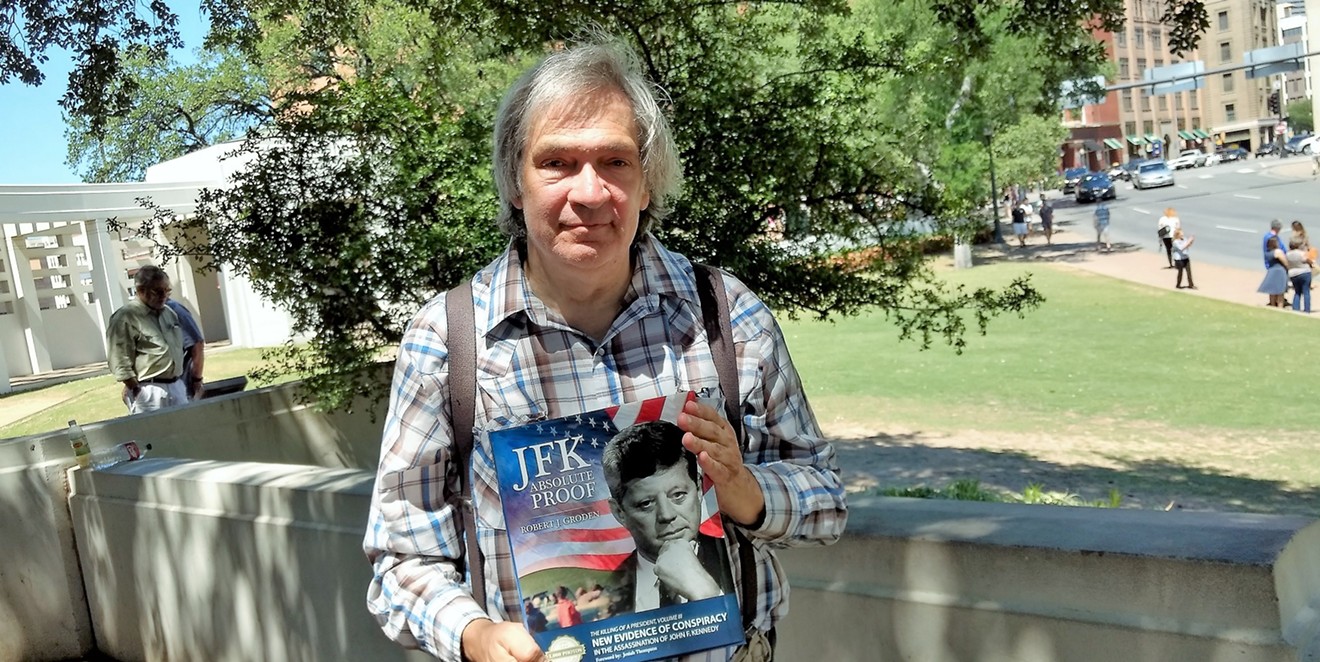Dallas' most famous President John F. Kennedy conspiracy theorist and an FBI analyst turned JFK historian agree on one thing: They don't expect much from the of assassination-related documents set to be released on Thursday.
For the conspiracy theorist, Robert Groden, the release isn't important because all the important stuff — any CIA or Secret Service documents that would buttress theories of a plot to kill Kennedy, have been destroyed.
"We might find some gems in this, but if we do, it will almost be an accident, stuff that they might have missed," Groden said. "But the really important stuff, the stuff about Oswald's connection to the CIA, all of that stuff is going to be withheld. The Secret Service destroyed all of theirs; they burned all of their files, so they won't be there. ... I don't think we're going to find out who actually did it unless Trump gets them to say that Hillary Clinton did it at the age of 16."
For Farris Rookstool III, the longtime Dallas FBI analyst who became the foremost authority on the Kennedy assassination investigations, Thursday's trove is too small to be significant. He says it represents just 1 percent of the total documents that have already be released by the federal government.
Rookstool says all the information that conspiracy theorists like Groden claim is missing or exists and hasn't been released is already out there. The information has just come out in such a way — in spurts and in no particular order — that it's been difficult for everything to be organized in a coherent way.
"We've been receiving, every year for 54 years, one piece of a puzzle that's sent to you randomly. You're not given the picture box to look at and see how to fit it all together," he says.
The government's clumsy record keeping and information releases results in more confusion, Rookstool says.
"They're not going to be released in a way that's going to make a whole lot of sense to most people," he says.
Rookstool became intimately familiar with the FBI's Kennedy assassination records during his time working at the Dallas field office. When photocopies of the records were made for the House Select Committee on Assassinations during the '80s, the copies were redacted to exclude sensitive information.
Whenever someone in the bureau needed access to the redacted information, he or she called Rookstool in Dallas, where an unredacted copy of the records was kept, and he read the information on a secure telephone. Because of all the time he spent working with the Kennedy file, he says, there's a good chance he's already read whatever will be released Thursday.
Most of the more than 5 million pages of federal government records generated during the investigation were released in the '90s after the passage of the JFK Records Act in 1992. That bill, signed Oct. 26, set a 25-year deadline for the release of all Kennedy investigation related documents, creating Thursday's deadline.
There are about 3,100 files left to be released, but Groden says he won't be spending his day combing through them.
"I'll let other people do that and let me know if they find anything of real value," Groden he says.
[
{
"name": "Air - MediumRectangle - Inline Content - Mobile Display Size",
"component": "18855504",
"insertPoint": "2",
"requiredCountToDisplay": "2"
},{
"name": "Editor Picks",
"component": "17105533",
"insertPoint": "4",
"requiredCountToDisplay": "1"
},{
"name": "Inline Links",
"component": "18349797",
"insertPoint": "8th",
"startingPoint": 8,
"requiredCountToDisplay": "7",
"maxInsertions": 25
},{
"name": "Air - MediumRectangle - Combo - Inline Content",
"component": "17105532",
"insertPoint": "8th",
"startingPoint": 8,
"requiredCountToDisplay": "7",
"maxInsertions": 25
},{
"name": "Inline Links",
"component": "18349797",
"insertPoint": "8th",
"startingPoint": 12,
"requiredCountToDisplay": "11",
"maxInsertions": 25
},{
"name": "Air - Leaderboard Tower - Combo - Inline Content",
"component": "17105535",
"insertPoint": "8th",
"startingPoint": 12,
"requiredCountToDisplay": "11",
"maxInsertions": 25
}
]












